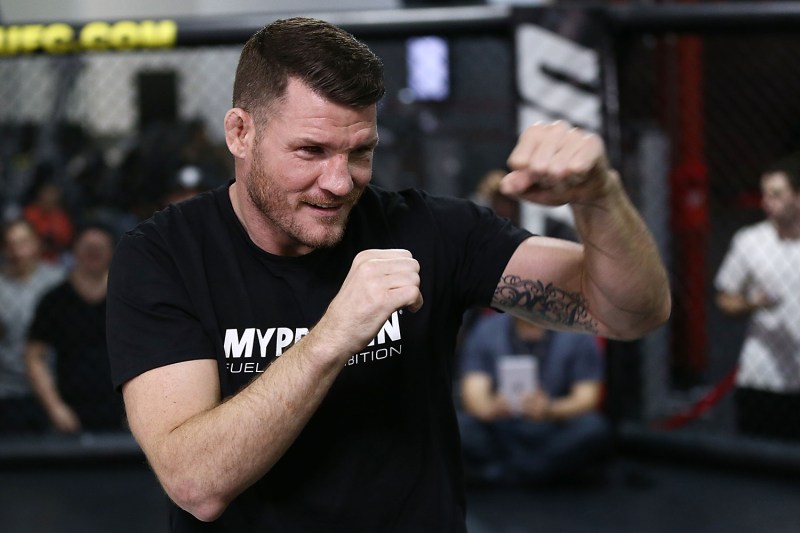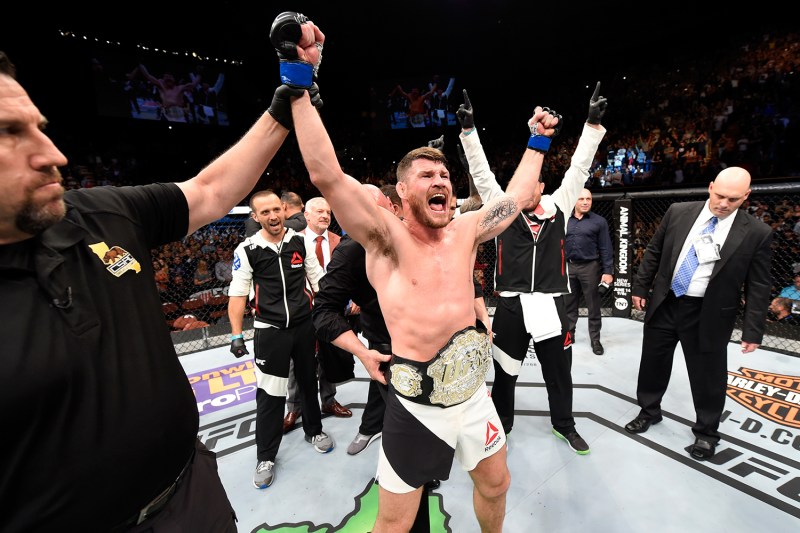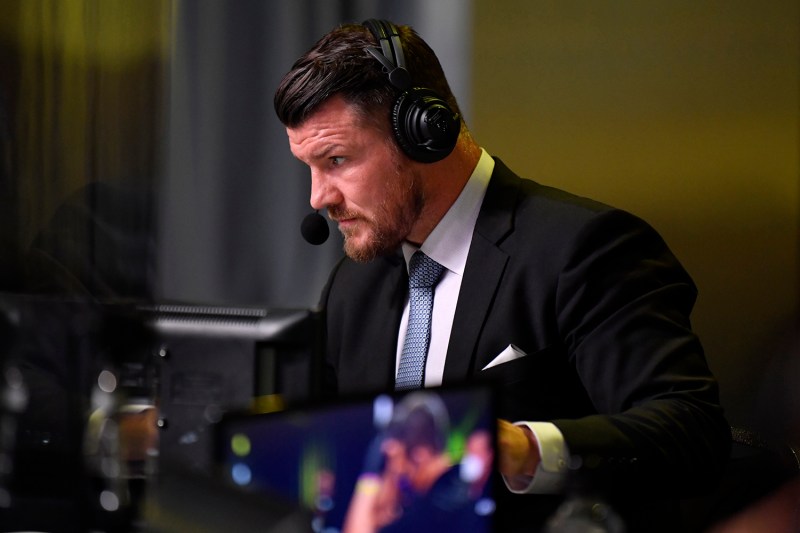
Michael Bisping, retired UFC middleweight champ and UFC Hall-of-Famer, is telling The Manual about what will be his first leading role in a feature film. The Journeyman, currently in pre-production and scheduled to shoot in fall 2021, follows a retired boxer suffering from chronic traumatic encephalopathy, or CTE. The disease, which is common in former fighters and football players, manifests itself as Alzheimer’s-like symptoms while they’re still in their middle ages. “There are so many fighters out there that have world-class talent, but they’re broke, they can’t pay the bills, they’re alcoholic,” the 42-year-old says. It’s clear he has sympathy for them as he prepares to take on the lead role. It’s also clear that he doesn’t see the connection.
Because if Bisping took honest stock of his years, he’d note the similarities between his life and that of the character’s. Indeed, if it weren’t for a mid-career injury, that fiction might have been his fact. Born to working-class parents, as are many fighters, the Manchester, England, native began fighting as a kickboxer to earn enough money to pay for university, which he believed would ensure he didn’t end up in a dead-end job. Over a 13-year pro mixed martial arts career, 11 of which were spent in the UFC, Bisping experienced the peak of his profession, winning his division belt against nemesis Luke Rockhold in 2016 despite one good eye and a laughably small 17-day notice. He is both the first and only British champion the UFC has ever had. But there were also plenty of lows, including a brutal knockout in 2013 that resulted in the eventual loss of his eye. Coming at the midpoint of his time as a fighter, Bisping says his injury made him realize that he would have to develop a plan B. “No one is interested in the washed-up ex-fighter. You’ve got to use your platform while you’ve got it.”
Related UFC Guides
And so he did. “I knew my time was limited,” Bisping says. “I started doing as much as I could.” He started a podcast, and at the time of this writing, Believe You Me has almost 150,000 subscribers on YouTube alone. He secured an agent, took acting lessons, and to date, he’s had parts in 15 films, with two features set to shoot in the next 12 months, including the Gerald Butler sequel Den of Thieves 2: Pantera. And he talked his way into the pre- and post-fight Fox Sports UFC shows, which led to being named to the analyst team of the network’s UFC Tonight. Come tonight, at the Conor McGregor and Dustin Poirier pay-per-view fight, he’ll be ringside for ESPN and BT Sport, offering commentary as a trusted source with an intimate perspective. “People ask me all the time, would I come back [to fight in the UFC]?” he says. “And the answer is no.”

He continues, “I get just as much of a rush sitting cage-side and calling the fight. I don’t miss the sport, because twice a month, I’m there and I’m heading up the show. It’s a dream come true for me.”
Bisping readily admits that, when scanning the former fighter roster, he’s hardly the man to point to as an athlete who got out clean. He lost his right eye, and his neck, which currently has a titanium plate and four screws, will require at least two more surgeries before it’s back to normal. He has two fake knees, and most days, before his workouts, he has to lather himself thick with Hemp Fusion’s CBD Pain Relief Balm
While he’s not without the scars, the amazing thing about Bisping is that he knew when to get out — and then he stayed out. Chuck Liddell, another former UFC champ and UFC Hall-of-Famer who was its first true breakout star in the Aughts, was last seen on the receiving end of a first-round KO at the hands of Tito Ortiz in 2018. At the time of the fight, Liddell was in his late 40s.
“That whole thing was horrible,” Bisping says, “and it didn’t sell well.”
And that’s the point: Fighting is a business, and if it’s not worth the cost, then it’s time to move on.
That’s certainly this principle with which Bisping views the upcoming McGregor and Poirier fight. Billed as the final installment of a trilogy in which each fighter knocked the other out, McGregor hopes to revenge himself after a January loss, while Poirier tries to notch a commanding win over a division great before moving on for a title challenge. McGregor, Bisping says, is the better striker, while Poirier “has more ways to win,” including the leg kicks that set up the McGregor knockout in January as well as takedowns, should he so choose.

But press him further. Ask why Poirier, the top lightweight contender who commands a higher pound-for-pound ranking than his division’s current champion, would fight a fifth-ranked fighter in a supposed rubber match, the first of which took place so long ago that most of the UFC’s current fanbase was not yet following the sport. What other reason, besides a blatant cash grab, might incentivize Poirier to sign on to the McGregor circus, especially after clearly displaying his superiority as a fighter six months ago?
“Listen, the world title’s great, but we’re here to make money as well,” says Bisping, a former world title-holder. “That’s going to be a huge payday for Dustin. Of course, he’s confident, and once he beats Conor again, he’s going to fight for the belt. So this way he gets his cake and he gets to eat it, too.”
There are few who know the business of fighting better than Michael Bisping. But he doesn’t miss the fighting itself, and you don’t have to look hard to see that the man has turned a corner not only in vocation, but in mindset. On June 27, while vacationing in New Orleans, one of the scariest men of his generation was sucker-punched by a busker on Bourbon Street. The old Bisping might have twisted that man’s arms until they made popping sounds or hit him so hard that he impaled himself on a drumstick. But the modern Michael Bisping? The analyst, the podcaster, the actor? That Michael Bisping just laughed, and, later, tweeted about it. “I wasn’t trying to be cool; my instinctive reaction was to piss myself in hysterics,” he says.
“When I was younger, I was a shit-talker, I was very competitive, and anybody in my division, I was quick to go on the attack. The old me 10 years ago, there would have been a problem there,” Bisping continues. “But in a lot of ways, that person doesn’t exist anymore. I’m not interested in rolling around in the street. There was no anger whatsoever. I guess I’m getting soft in my old age.”



